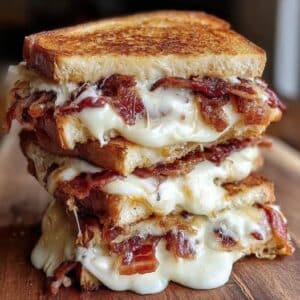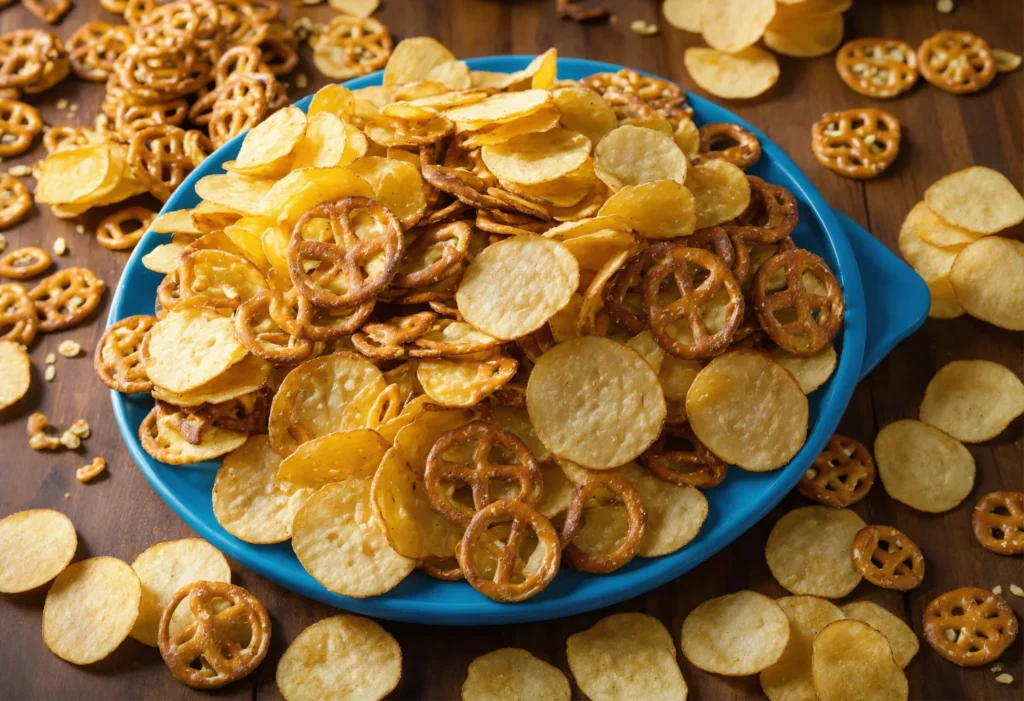
In the pursuit of healthier snacking, the comparison between pretzels and potato chips poses a crunchy conundrum for many. This article explores the nutritional battleground, comparing these popular snacks in terms of calories, fat content, vitamins, and their impact on health. Additionally, We’ll also explore alternative snacks and address common questions, offering a comprehensive guide to making informed choices in the realm of snacking. Are pretzels more healthy than potato chips? Let’s delve into the details. This introduction aims to shed light on the question: Are pretzels more healthy than potato chips?
Are Pretzels Healthier Than Potato Chips? An In-Depth Look
The Popularity of Pretzels and Potato Chips
In our nutritional comparison, we closely examine whether pretzels are more healthy than potato chips in terms of their nutritional content. Snack time! It’s that moment when your stomach rumbles, and you find yourself standing in front of the pantry, eyeing the pretzels and potato chips. Ah, the age-old snack debate: pretzels or potato chips? Both are staples in American snack culture, each boasting a legion of fans. But when it comes to health, which one takes the crown?
Pretzels, with their classic twist and satisfying crunch, have long been seen as a healthier alternative to other snacks. On the other hand, potato chips, with their irresistible crispiness and variety of flavors, often get labeled as the less healthy option. But is this really the case?
In this part of our snack saga, we’ll unravel the mystery. We’ll crunch the numbers, compare the nutritional facts, and see which snack emerges as the healthier choice. So, grab a seat (and maybe a snack), as we dive into the world of pretzels and potato chips!
Nutritional Showdown: Pretzels vs. Potato Chips
Caloric Content and Fat Comparison
When it comes to snacking, the numbers on the nutrition label play a crucial role. Let’s start with the calorie count. Pretzels typically boast a lower calorie content compared to potato chips. For instance, a serving of pretzels might hover around 110 calories, while the same amount of potato chips can pack up to 160 calories. This difference, though seemingly small, can add up in the long run, especially for those mindful of their calorie intake.
Now, let’s talk about fat. Potato chips are often high in fats, including the dreaded saturated fats, which can be a red flag for heart health. Pretzels, on the other hand, are generally low in fat, making them a seemingly smarter choice for those watching their fat intake. However, it’s not just about quantity but also the quality of fats. Some potato chips are made with healthier oils, which can slightly tip the scales in their favor.
Vitamins and Minerals Face-off
Moving beyond calories and fat, vitamins and minerals come into play. Pretzels often contain more folic acid, essential for cell growth and overall health. Potato chips, however, are not to be underestimated. They can be a source of vitamin E, crucial for healthy cell function.
But here’s the twist: the type of pretzel or potato chip matters. Whole grain versions of these snacks can offer more in terms of fiber and nutrients, making them a better choice over their refined counterparts.
In this round of the snack showdown, it seems pretzels might have a slight edge in terms of calories and fat, but potato chips can hold their own with certain vitamins. It’s a close call, and the decision might boil down to personal health goals and preferences.
Analyzing Health Impacts: Pretzels vs. Chips
Effects on Blood Sugar Levels
When it comes to impacting blood sugar levels, not all snacks are created equal. Pretzels, despite their lower fat content, can be a bit of a double-edged sword. They are often made from refined flour, which the body quickly converts to sugar, leading to a rapid spike in blood glucose levels. This can be particularly concerning for individuals with diabetes or those trying to manage their blood sugar.
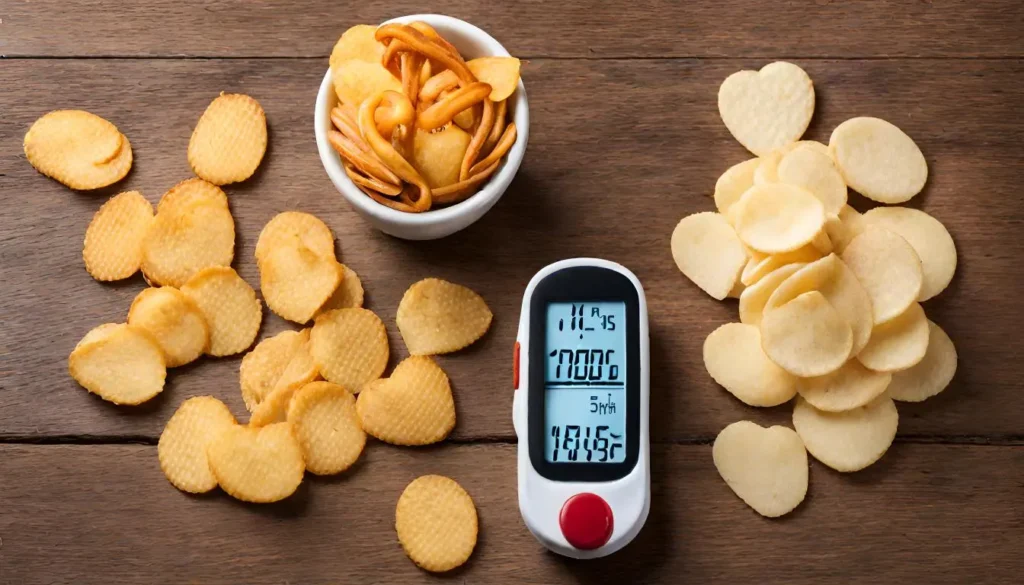
Potato chips, while higher in calories and fat, have a more complex structure due to their starch content. This complexity means they might not cause as immediate a spike in blood sugar as pretzels. However, this doesn’t give them a free pass, as overindulging in potato chips can still lead to long-term health issues, including weight gain and increased risk of diabetes.
Sodium Intake and Heart Health
Sodium intake is another critical factor in the snack debate. Pretzels are notorious for their high sodium content, which can be a concern for those monitoring their blood pressure or heart health. Excessive sodium intake is linked to hypertension, a risk factor for heart disease.
Potato chips, while also containing sodium, often have less than pretzels. However, the type of potato chip matters. Some flavored varieties are loaded with salt, negating this advantage. For heart health, it’s essential to consider not just the type of snack, but also the portion size and frequency of consumption.
In this health-focused round, both pretzels and potato chips have their drawbacks. The key is moderation and being mindful of the specific health concerns you might have.
Dietary Insights: Pretzels and Potato Chips in Different Lifestyles
Snacking for Weight Management
For those on the journey of weight management, choosing the right snack can be pivotal. Pretzels, with their lower calorie count, might seem like the obvious choice. However, their high carbohydrate content and low satiety factor can lead to overeating. It’s easy to munch through a large bag of pretzels without feeling full, potentially leading to calorie overload.
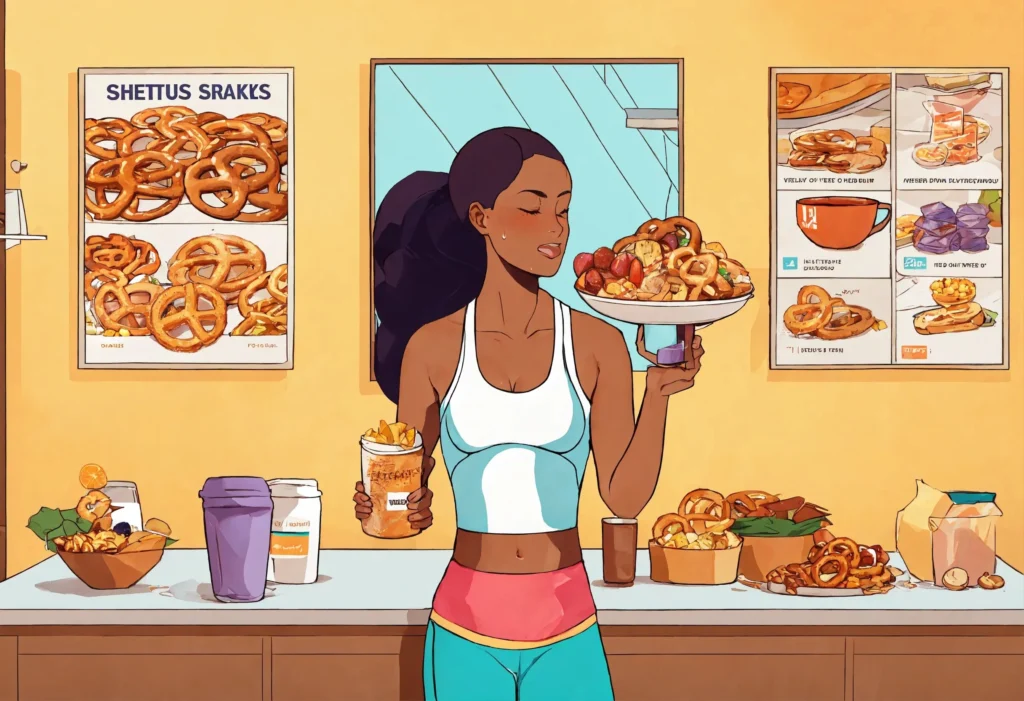
Potato chips, on the other hand, are higher in calories and fats, which might initially seem counterintuitive for weight loss. But the higher fat content can increase feelings of fullness, potentially leading to less snacking overall. The trick is portion control. A small, measured amount of potato chips might be more satisfying and less likely to lead to overeating compared to a larger volume of pretzels.
Snacks for Diabetics and Heart Patients
For individuals with diabetes or heart conditions, the choice of snack requires careful consideration. The high sodium content in pretzels is a concern for heart patients, as it can contribute to hypertension. Additionally, the quick-digesting carbohydrates in pretzels can cause undesirable spikes in blood sugar levels for diabetics.
Potato chips, while not ideal, might offer a slightly better option in moderation. The key is to choose chips that are lower in sodium and made with healthier oils. Some brands offer baked or air-fried chips, which can be lower in calories and fats, making them a more suitable option for those with heart concerns.
In this part of our snack exploration, it’s clear that both pretzels and potato chips can be included in various diets, but mindfulness and moderation are crucial. Understanding one’s dietary needs and health goals is essential in making the right snack choice.
For individuals with diabetes, choosing snacks that align with their dietary needs is crucial. For comprehensive dietary guidelines tailored to diabetics, visit Diabetes.org.
Exploring Healthier Snack Alternatives
Nuts, Seeds, and Fruits
For those seeking a healthier path in their snacking habits, the world of nuts, seeds, and fruits offers a treasure trove of options. Nuts like almonds, walnuts, and pistachios are not only delicious but also packed with healthy fats, proteins, and fiber. They provide a satisfying crunch and are known for their heart-healthy benefits. Seeds, such as chia, flaxseed, and pumpkin seeds, are nutritional powerhouses, rich in omega-3 fatty acids and fiber.
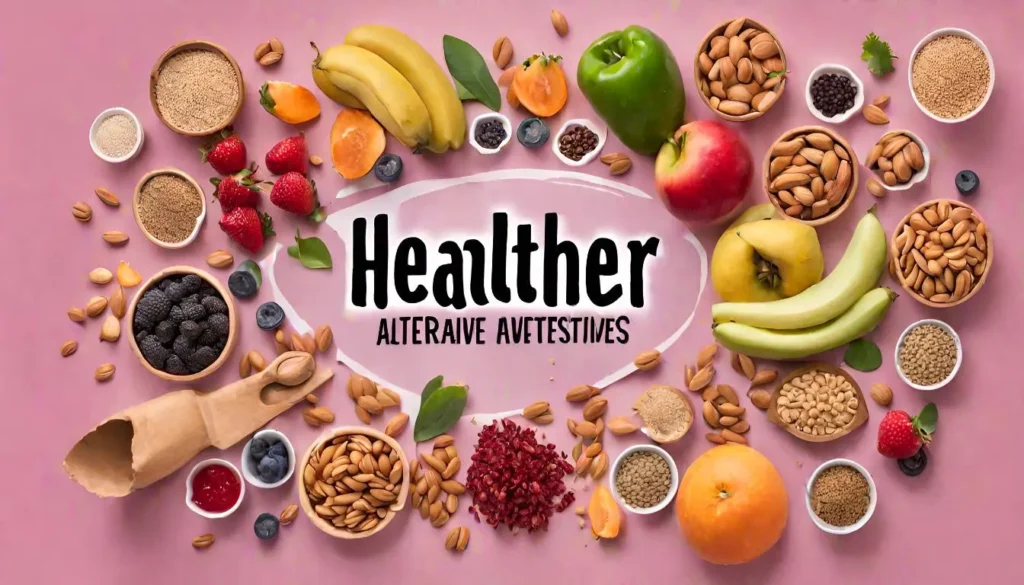
Fruits, whether fresh or dried, are a sweet alternative to processed snacks. They are loaded with vitamins, minerals, and antioxidants, offering a natural sugar fix without the empty calories of pretzels or potato chips. Pairing fruits with a handful of nuts or a dollop of nut butter can create a balanced snack that is both nutritious and filling.
Whole Grains and High-Fiber Options
Whole grains are another excellent alternative for health-conscious snackers. Options like whole-grain crackers, air-popped popcorn, and oatmeal bars offer the fiber and nutrients missing in refined snacks like pretzels. These whole-grain snacks can help regulate blood sugar levels and keep you feeling fuller for longer, aiding in weight management and overall health.
High-fiber snacks, such as vegetable sticks with hummus or yogurt with berries, are not only nutritious but also help in maintaining digestive health. They provide essential nutrients while keeping calorie counts in check, making them ideal for those looking to snack smart.
In this exploration of healthier snacks, it’s clear that there are abundant options beyond the realm of pretzels and potato chips. By choosing snacks that are rich in nutrients, fiber, and healthy fats, you can satisfy your hunger pangs in a way that benefits your overall health and well-being.
Frequently Asked Questions
Common Queries About Pretzels and Potato Chips
Q: Are pretzels or potato chips better for weight loss?
A: When it comes to weight loss, the key is moderation and balance. Pretzels are lower in calories and fat but can be high in sodium and lack satiety, leading to overeating. Potato chips, while higher in fat, can be more satisfying in smaller portions. Opt for whole-grain or baked varieties and watch your portion sizes.
Q: Can diabetics safely eat pretzels or potato chips?
A: Diabetics need to be cautious with both pretzels and potato chips due to their potential impact on blood sugar levels. Pretzels, made from refined flour, can cause a quick spike in blood sugar. Potato chips have a slower impact but should still be consumed in moderation. Always check the labels for total carbohydrates and opt for lower-sodium, lower-fat versions.
Q: Are there any heart-healthy alternatives to pretzels and potato chips?
A: Yes, heart-healthy snack alternatives include nuts, seeds, whole grains, and fresh fruits. These options are lower in sodium and rich in nutrients like fiber, healthy fats, and antioxidants. For more information on heart-healthy diets, visit the American Heart Association.
Q: How can I make pretzels or potato chips healthier?
A: To make these snacks healthier, choose versions made with whole grains, lower sodium, and healthier oils. Baking or air-frying at home can also reduce fat content. Pairing them with a protein-rich food like cheese or yogurt can balance the nutritional profile and increase satiety.
Q: What are some quick and healthy snack options for busy days?
A: Quick, healthy snacks include a handful of mixed nuts, Greek yogurt with berries, apple slices with peanut butter, or carrot sticks with hummus. These options are not only nutritious but also easy to prepare and consume on the go.
Conclusion
Final Thoughts on Pretzels and Potato Chips
As we reach the end of our snack exploration, it’s clear that the choice between pretzels and potato chips isn’t just black and white. Both have their pros and cons, and the best choice depends on individual health goals, dietary needs, and personal preferences.
For those watching their calorie intake and fat consumption, pretzels might seem like the better option. However, it’s important to be mindful of their high sodium content and the potential for overeating due to their low satiety factor. On the other hand, potato chips, while higher in fats and calories, can be more satisfying in smaller quantities and offer a slower impact on blood sugar levels.
The key takeaway is moderation. Whether you choose pretzels, potato chips, or any other snack, keeping portion sizes in check is crucial. Pairing these snacks with healthier options like fruits, nuts, or yogurt can also help balance their nutritional profile.
Ultimately, the best snacking strategy is one that includes a variety of foods, focusing on whole, nutrient-rich options while allowing room for occasional indulgences. By being mindful of what we eat and how much, we can enjoy our favorite snacks without compromising our health goals. To learn more about maintaining a balanced diet and effective portion control, visit ChooseMyPlate.gov. This resource can help you make informed decisions about your daily food choices.
Remember, snacking doesn’t have to be a guilty pleasure. With the right choices and moderation, it can be a delicious and healthy part of our daily diet.
We hope this article has provided valuable insights into the world of pretzels, potato chips, and healthy snacking. Happy snacking, and here’s to making informed and delicious choices!
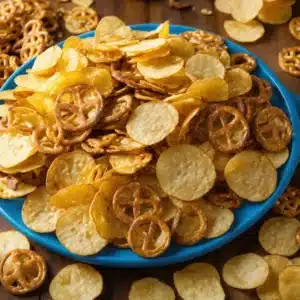
Pretzels vs. Potato Chips
Ingredients
Method
- Choose between pretzels and potato chips based on your nutritional needs and preferences.
- Monitor portion sizes to avoid overeating.
- Consider pairing snacks with healthier options like fruits or nuts.
Notes
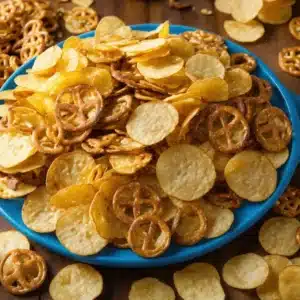
Nutritional Comparison of Pretzels and Potato Chips
Ingredients
Method
- Consider your personal health goals and preferences when choosing between pretzels and potato chips.
- Analyze the nutritional content: compare calories, fat, vitamins, and minerals.
- Opt for whole grain or healthier versions if available.

